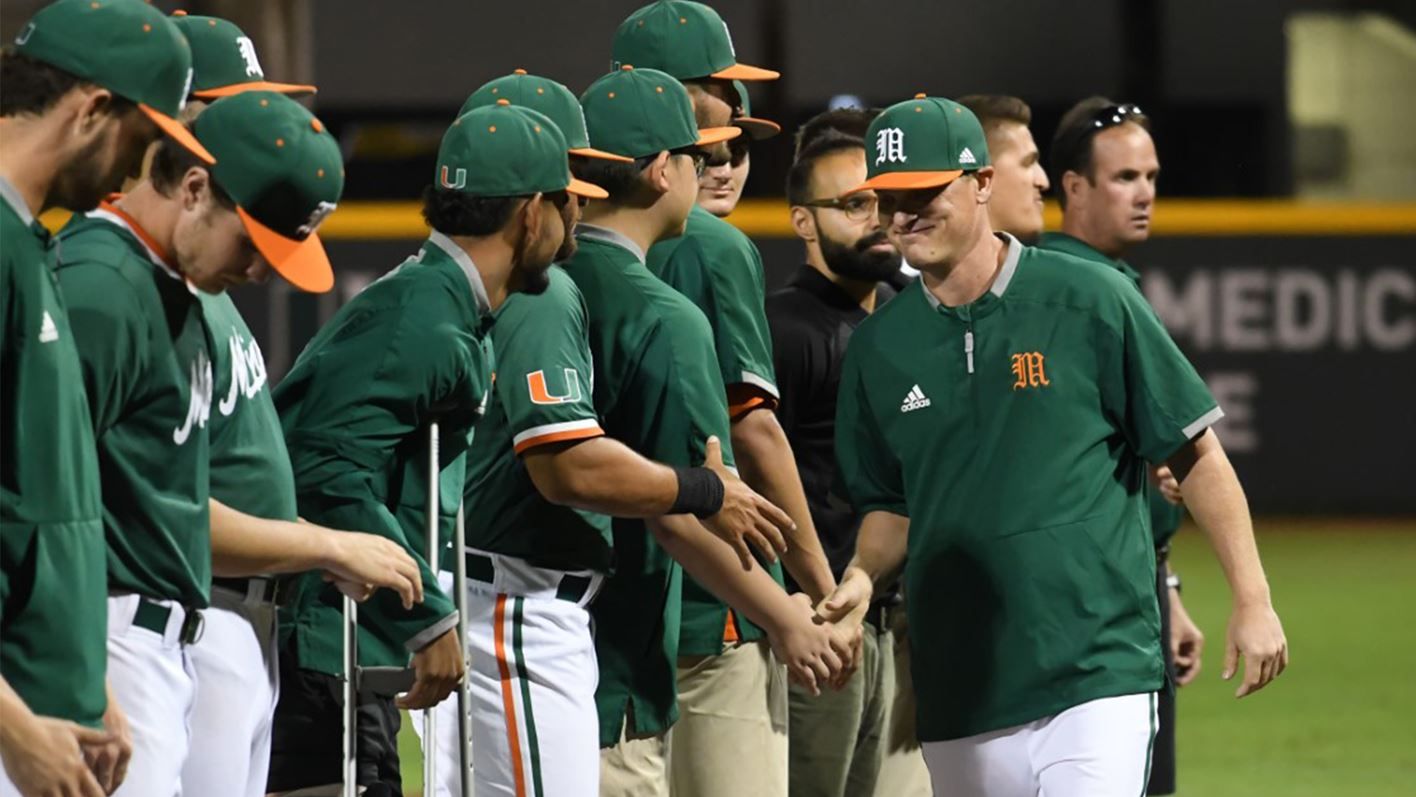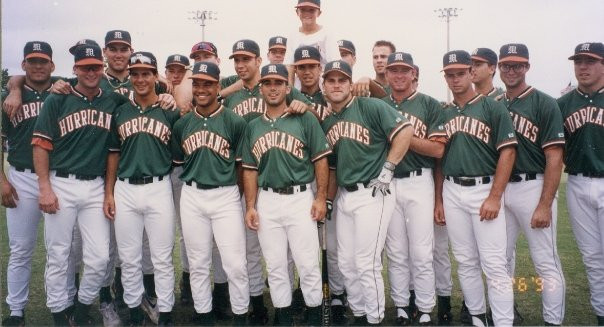
Anderson Back Home at The Light
It was a simple act of kindness that changed Jonathan Anderson’s life forever.
Miami Hurricanes pitcher Gus Gandarillas saw a seven-year-old kid dressed head-to-toe in his baseball uniform walking outside the fence at Mark Light Field.
Instead of signing an autograph or tossing him a ball, Gandarillas asked the boy to play catch and shag fly balls during batting practice at his first Hurricanes game in 1992.
It became routine.
Anderson and his mom, Martha, would arrive at The Light a couple of hours before first pitch and Gandarillas would tell him to hop the fence.
“From that day on, it seemed like every single day when we had a game he was out there,” said Gandarillas, who went onto play 11 years of professional baseball. “He was a good, polite, fun kid. He was very respectful. You can tell he was brought up the right way. He just loved being around us. If he could have gone to every single practice, I think he would have.”
After a few weeks, Gandarillas approached legendary head coach Ron Fraser. He asked the “Wizard of College Baseball” if Anderson could join the team.
The following game when Anderson arrived at the ballpark, Gandarillas shared the exciting news with Anderson and his mom.
“He turned to my mom and told her that she could go into the stadium,” he recalled. “Gus said to my mom, ‘Ms. Anderson, he’s coming in with us tonight. He’s going to meet Coach Fraser and he’s going to be the bat boy.’ It took off from there.”
Anderson became the Hurricanes’ regular bat boy for the rest of Fraser’s final season. The players treated him like he was one of the guys.
He celebrated with the team after the Canes clinched a spot in the College World Series, jumping into the dog pile in Fraser’s last game in Coral Gables.
The players became his role models and he looked up to them like they were his older brothers.
“He was always around the ballpark. For him, that was his playground,” said Miami head coach Gino DiMare, who was in his senior year when Anderson first became bat boy. “I can only imagine how it would feel if you got to go inside the ropes, be on the field, be in the dugout, be around the guys at that age. That had to be a huge influence on his life.”
Anderson became even more involved with the program.
He started going to fall practices and scrimmages before the season started. He was at every game and went to their baseball summer camp. Before he became UM’s pitching coach and the program’s all-time wins leader, J.D. Arteaga would drive Anderson to and from the field every day for camp.
He was a part of the Miami Hurricanes baseball family.
When Miami waited to find out its postseason fate, Anderson was in the locker room. He attended team banquets. Players would come over to his house for dinner. Power-hitting first baseman Aubrey Huff even helped him move into his house.
He formed relationships with Hurricane greats like Arteaga, Huff, Pat Burrell, Alex Cora, Bobby Hill, Charles Johnson and Jason Michaels.
“I wanted to try and be as good as they were. I wanted to play in that type of environment. That motivated me,” Anderson said. “I was watching the highest caliber of collegiate baseball. I was learning and watching from the best of the best. I got to watch the University of Miami every single day.”
In a 12-year span before Anderson left for college, Miami made it to the College World Series nine times and won the national championship twice.
He dreamed of being a Miami Hurricane.
As an athlete, Anderson hit his stride late at Gulliver Prep. He had conversations with multiple schools about playing collegiately, including UM.
While the Hurricanes’ coaching staff gave him the chance to join the team, Anderson couldn’t pass up the remarkable opportunity to attend Duke University.
“My family, my close friends, my baseball coaches were very much a big influence me and helped me get to where I got. However, without the University of Miami, without the example that those players and coaches set for me, I don’t think I end up going to Duke University, one of the best schools in the world,” he said.
A two-way player as an outfielder and pitcher, Anderson tallied a .337 average in his senior campaign while posting a sparkling 2.91 ERA over 52.2 innings and three saves. He led Duke and was third in the nation with 20 sacrifice bunts in his final season as well. He stole 41 bases, the 10th most in school history when he graduated.
To cap off his collegiate career, Anderson and the Blue Devils played at Mark Light Field. He opened the series on the mound with Gandarillas and his family in the stands and with DiMare, Arteaga and longtime head coach Jim Morris in the opposing dugout.
“I don’t think I end up playing baseball there. I had such a drive to be like a Miami Hurricane from an academic standpoint, a baseball standpoint and a character standpoint.”
Upon his graduation, Anderson went straight into coaching at his alma mater, spending two years at Duke working with the outfielders, overseeing bunting and also helping out with the hitters and baserunners. Additionally, he wasthe director of Duke Baseball Academy camps, managed the recruiting database and assisted with academic development, compliance and travel.
After a couple of seasons on the Blue Devils’ staff, Anderson became an assistant coach at Dartmouth, including the final seven as the lead assistant coach for the Big Green. At Dartmouth, he served as the third base coach, worked with the outfielders and oversaw the hitters and recruiting.
“I loved playing. I love baseball. I had a lot of really impactful coaches when I was a kid,” Anderson said about his passion for coaching. “I looked at them as influences and I was passionate about staying in the game and trying to pay it forward.
Throughout his coaching career, he stayed in touch with Morris, DiMare and Arteaga, sending them congratulatory messages when they made it to Omaha and checking in with them after tough losses.
Despite forging his own path elsewhere, he continued to support Miami.
His constant communication with the Hurricanes’ coaches led to his next opportunity. DiMare offered Anderson the chance to return to Coral Gables and join Miami’s staff.
“It was a no brainer for me to come back. This is where I’ve always wanted to be,” Anderson said. “He knew I always wanted to be a part of the University of Miami. He called me on the phone and he asked me if I would be interested in it. He offered to fly me down so he could show me around the school and the facilities. I kind of laughed inside because he didn’t need to show me the facilities or anything. I already knew where everything is and I was already sold.”
Now, more than 25 years after his first trip to Mark Light Field, the former bat boy is the Hurricanes’ director of player development.
Anderson assists with a variety of duties, including coordinating video, baseball analytics and recruiting.
And while his first season on staff was cut short due to COVID-19, his impact was felt enormously by the coaches and players.
“He is an overachiever. It’s a great characteristic for a coach,” DiMare said. “My goal would be to keep him here forever. He knows as much about the program as I do. He knows everything about the program. He bleeds orange and green.”
The Hurricanes baseball program has been a part of Anderson’s life since his first visit to Mark Light Field.
And instead of hopping the fence to play catch or shag fly balls like he did when he was a little kid, he gets to live out his dream every day working with the program that means so much to him.
“I loved the players. I love working with the coaches. I love working with our support staff. I love it every single day. I’m unbelievably excited to go to work. The most special thing every single day is just walking on the field for me. I’ve never had a bad day on that field. I tried to tell our players how lucky they are to be Hurricanes and to play here at Mark Light,” Anderson said.
“I want to instill in our players and do my part, what we’ve done in the past and how we want to keep that going forward. We have a pretty darn special past. If we can replicate our past, we’re going to have a special future without question.”







